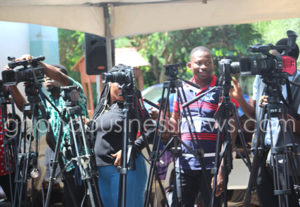Not enough protection for journalists in Ghana – World Press Freedom Index
 Although Ghana continues to be seen as one of the most democratic countries in Africa and Chapter 12 of its 1992 Constitution guarantees media pluralism and independence, the 2021 World Pres Freedom Index says that there is not enough protection for journalists in the country.
Although Ghana continues to be seen as one of the most democratic countries in Africa and Chapter 12 of its 1992 Constitution guarantees media pluralism and independence, the 2021 World Pres Freedom Index says that there is not enough protection for journalists in the country.
Out of 180 countries assessed, Ghana ranked 30, the same position it attained in the 2020 report with an improvement in its indicative points. However, the current ranking just like in 2020 is the lowest the country has ever recorded.
Twenty years after the right to information (RTI) law was first introduced in parliament, it was finally adopted but not with restrictive access to information at the presidency and exempts information relating to some government institutions.
The 2021 Index indicates that in Ghana politicians have made death threats against investigative reporters and a third of the Ghanaian media are owned by the state or by businessmen linked to the government. “A group of investigative journalists had to spend part of 2018 in hiding after producing a documentary about corruption in Ghanaian soccer.
A ruling party parliamentarian who had been named in the documentary publicly threatened one of the journalists without ever being arrested or questioned. A few months later, the journalist was shot dead in the streets.
The investigation announced by the authorities has ground to a halt. Even though journalists are rarely arrested, investigative reporters are often threatened in the country” the report stated.
It states that most cases of police aggression against journalists go unpunished but timid attempts have been made to combat this impunity.
In 2019, three policemen were suspended after attacking journalists. Nonetheless, journalists covering the effectiveness of the government’s measures against COVID-19 were attacked by police again in 2020.
Although there was less deterioration in Africa’s “Abuses” score, it continues to be the most violent continent for journalists, and the COVID-19 pandemic fuelled the use of force to prevent journalists from working.
According to the 2021 World Press Freedom Index, journalism is currently blocked in more than 130 countries and the pandemic has been used as grounds to close off journalists’ access to information sources and reporting in the field. Journalists are finding it increasingly hard to investigate and report sensitive stories, especially in Asia, the Middle East and Europe.
The coronavirus pandemic has compounded the huge difficulties for journalism in sub-Saharan Africa, where 23 of the 48 countries (two more than in 2020) are now marked as red or black on the World Press Freedom map, meaning the situation is classified as bad or very bad.
According to the latest Index by the Reporters Without Borders, reporters are being attacked and arrested, their incomes falling, and media undermined by misinformation and draconian laws.
Journalistic pluralism and rigorous reporting serve to combat disinformation and “infodemics”, including false and misleading information but the 2021 Edelman Trust barometer reveals a disturbing level of public mistrust of journalists, with 59 per cent of respondents in 28 countries saying that journalists deliberately try to mislead the public by reporting information they know to be false.
“Journalism is the best vaccine against disinformation,” RSF Secretary-General, Christophe Deloire said.
“Unfortunately, its production and distribution are too often blocked by political, economic, technological and, sometimes, even cultural factors. In response to the virality of disinformation across borders, on digital platforms and via social media, journalism provides the most effective means of ensuring that public debate is based on a diverse range of established facts.”
This year’s Index which evaluates the press freedom situation in 180 countries and territories annually, shows that journalism is totally blocked or seriously impeded in 73 countries and constrained in 59 others, which together represent 73 per cent of the countries evaluated.
These countries are classified as having “very bad,” “bad” or “problematic” environments for press freedom, and are identified accordingly in black, red or orange on the World Press Freedom map.
By Theodora Aidoo
Copyright ©2021 by NewsBridge Africa
All rights reserved. This article or any portion thereof may not be reproduced or used in any manner whatsoever without the express written permission of the publisher except for the use of brief quotations in reviews.
